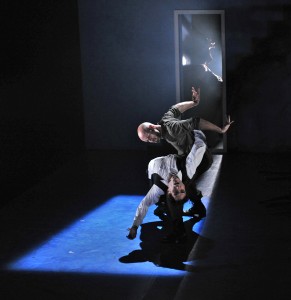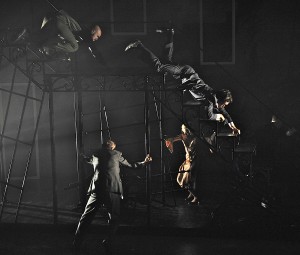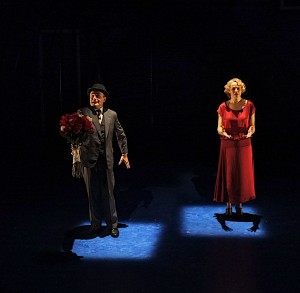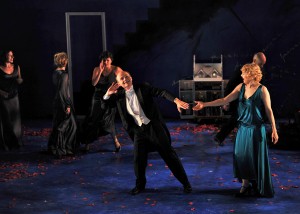WHO’S AFRAID OF ADAPTING VIRGINIA WOOLF?
Virginia Woolf’s Mrs. Dalloway beautifully intertwines the inner and outer worlds of her characters, seamlessly sweeping from description to dialogue, from one character’s consciousness to another’s, from the past to the present. Ripe Time physicalizes not only the narrative of Woolf’s post-WWI classic,  but her evocative style in the breathtaking theatrical adaptation Septimus & Clarissa.
but her evocative style in the breathtaking theatrical adaptation Septimus & Clarissa.
Adapter Ellen McLaughlin telescopes the action of Mrs. Dalloway to a fine focus on two characters, war veteran Septimus Warren Smith and 52-year-old housewife Clarissa Dalloway. Suffering from post-traumatic stress disorder upon his return from the war, Septimus is shot through with violent memories. Tommy Schrider’s gripping portrayal of Septimus includes a notable nervous tick; he blinks as if continually trying to awaken himself to the present, but the violence keeps jolting him back. Rachel Dickstein’s imaginative and highly physical direction, choreographed in collaboration with the ensemble, tumbles backwards and anxiously scrambles across the floor of his war-torn memory.
 On the same June day, Clarissa prepares for a party and finds herself swept up in memories of a youthful romance with Peter Walsh, an adventurous gentleman who has just returned to London. Present-day Clarissa (the regal McLaughlin) and Peter (Tom Nelis) are ghosted by their past selves, the nimble LeeAnne Hutchinson and Craig Baldwin. McLaughlin’s poetic adaptation employs a stunning fluidity of times and identities; dialogue crosses from first-person to third-person and from one character to another, while Dickstein’s direction crafts a romantic affect that flows across the stage in swirling, sweeping movements.
On the same June day, Clarissa prepares for a party and finds herself swept up in memories of a youthful romance with Peter Walsh, an adventurous gentleman who has just returned to London. Present-day Clarissa (the regal McLaughlin) and Peter (Tom Nelis) are ghosted by their past selves, the nimble LeeAnne Hutchinson and Craig Baldwin. McLaughlin’s poetic adaptation employs a stunning fluidity of times and identities; dialogue crosses from first-person to third-person and from one character to another, while Dickstein’s direction crafts a romantic affect that flows across the stage in swirling, sweeping movements.
 Integral to this sweep of post-WWI London is Susan Zeeman Rogers’ set design: a towering iron staircase, wheeled and whirled about the space. Keith Parham’s evocative lighting juxtaposes the sharp shadows of Septimus’ war memories with the soft glow of Clarissa’s lost love, and the original score by Gina Leishman – intertwined with Jane Shaw’s sound design of a persistently ticking clock – provides a sparse and haunting backdrop.
Integral to this sweep of post-WWI London is Susan Zeeman Rogers’ set design: a towering iron staircase, wheeled and whirled about the space. Keith Parham’s evocative lighting juxtaposes the sharp shadows of Septimus’ war memories with the soft glow of Clarissa’s lost love, and the original score by Gina Leishman – intertwined with Jane Shaw’s sound design of a persistently ticking clock – provides a sparse and haunting backdrop.
This poignant production will undoubtedly linger in the audience’s collective memory as one of the most creatively-crafted literary adaptations ever placed on stage. With its nuanced ensemble performances, rich physical vocabulary, and stunning stage images, Ripe Time’s awe-inspiring Septimus & Clarissa is not to be missed.
photos by Richard Finkelstein
Septimus & Clarissa
Baruch Performing Arts Center
scheduled to end on October 8, 2011
for tickets, visit https://web.ovationtix.com/trs/pr/857825


